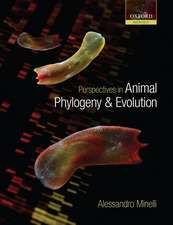The Origins of Evolutionary Innovations: A Theory of Transformative Change in Living Systems
Autor Andreas Wagneren Limba Engleză Paperback – 14 iul 2011
| Toate formatele și edițiile | Preț | Express |
|---|---|---|
| Paperback (1) | 433.09 lei 31-37 zile | |
| OUP OXFORD – 14 iul 2011 | 433.09 lei 31-37 zile | |
| Hardback (1) | 836.43 lei 31-37 zile | |
| OUP OXFORD – 13 iul 2011 | 836.43 lei 31-37 zile |
Preț: 433.09 lei
Preț vechi: 493.83 lei
-12% Nou
Puncte Express: 650
Preț estimativ în valută:
82.88€ • 89.100$ • 69.62£
82.88€ • 89.100$ • 69.62£
Carte tipărită la comandă
Livrare economică 11-17 aprilie
Preluare comenzi: 021 569.72.76
Specificații
ISBN-13: 9780199692606
ISBN-10: 0199692602
Pagini: 264
Ilustrații: 100 black and white illustrations
Dimensiuni: 188 x 247 x 17 mm
Greutate: 0.59 kg
Ediția:New.
Editura: OUP OXFORD
Colecția OUP Oxford
Locul publicării:Oxford, United Kingdom
ISBN-10: 0199692602
Pagini: 264
Ilustrații: 100 black and white illustrations
Dimensiuni: 188 x 247 x 17 mm
Greutate: 0.59 kg
Ediția:New.
Editura: OUP OXFORD
Colecția OUP Oxford
Locul publicării:Oxford, United Kingdom
Recenzii
This book will surely be influential with the next generation of evolutionary biologists, who will be able to digest and then apply the significance of a network-centric view of adaptation. Such a perspective will be essential for interpreting the increasing number of empirical studies that recapitulate evolutionary innovations in laboratory experiments. But even those molecular and evolutionary biologists who do not actively work on problems of innovation will benefit from the clarity of Wagner's theoretical arguments, and the inspiring wealth of empirical examples that demonstrate a new way to think of the dynamics of adaptation.
Notă biografică
Andreas Wagner is professor in the Institute of Evolutionary Biology and Environmental Sciences at the University of Zurich in Switzerland, and External Professor at the Santa Fe Institute for the study of Complex Systems. His main research interest is the evolution of biological systems, from genes to complex biological networks with thousands of components. He received his Ph.D in 1995 at Yale University, and has since held research fellowships at several institutions, such as the Institute for Advanced Studies in Berlin, Germany, and the Institut des Hautes Etudes in Bures-sur-Yvette, France. Author of more than 100 scientific publications and two books, he has lectured widely worldwide. He is a member of the Faculty of 1000 Biology, as well as of the editorial boards of several scientific journals, including Bioessays, BMC Evolutionary biology, Molecular Genetics and Genomics, and Molecular and Developmental Evolution.















